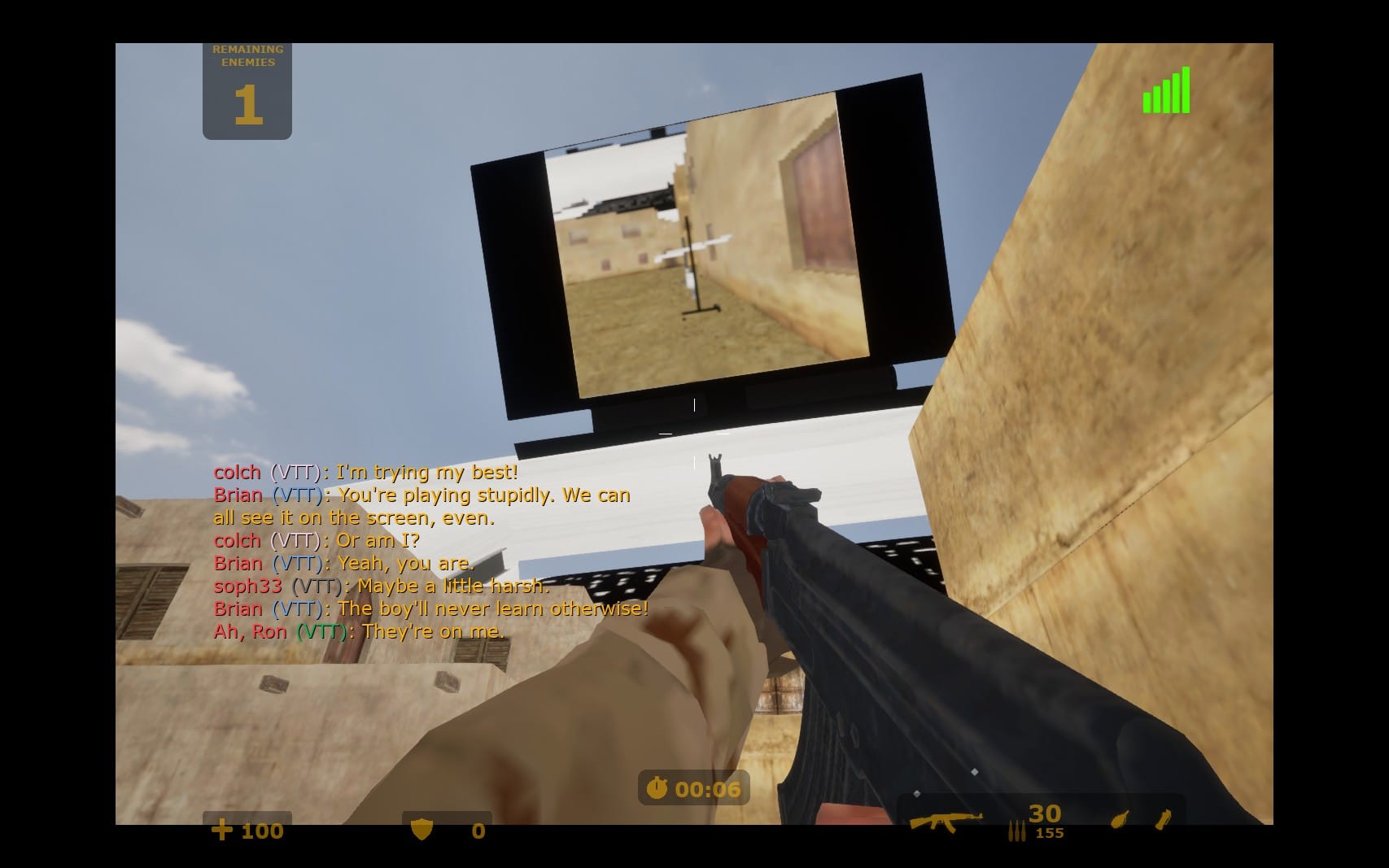WordPlayer: It Takes a War Is a Sad, Loving Ode to Your Friend List
A lifetime of memories

It Takes A War - the new game from Thomas Mackinnon, developer of The Corridor - opens in a way that few single-player games do: by pretending to check your Internet connection and microphone before dropping you into the first round of a fake, Counter-Strike-inspired deathmatch game.
As you run through the TDM_FILTH map, gunning down the enemy team with a small variety of generic weapons, the rest of your team is filled out with a squad of players who all clearly know each other and have a history of playing games together. You're the lone rando, and you're told your microphone privileges will only activate once you've played a match through to completion.
In other words, you can't join in on the conversation, but you're going to have to listen to it. What feels like it's going to be a quick game soon turns into something else entirely: a seemingly never-ending, increasingly existential experience, one that you're going to have to ride out with these strangers.

I'm going to do that annoying rhetorical thing where I admit that I have to really talk around It Takes A War somewhat in this article. I'm not going to say you should go into the game completely blind - I would like you to stick around to read this piece, after all. This isn't a game predicated on a massive twist so much as it does a bunch of fun and interesting stuff across its 45-odd minute runtime. I can say that the game gets weird in ways that I liked, that I'm comfortable recommending it to anyone who likes interesting narrative experiments, and leave it at that.
What I can say, without spoiling any of that weirdness, is that It Takes A War is a single-player game about playing games with your friends. Perhaps more pointedly, it's about your friend list - that list of people on your system that you, ostensibly, could jump into a game with at any time. If you're anything like me, you've accumulated a lot of people on your friend lists across multiple consoles over the years.
It could be that you have a dedicated group of people you play with often. Perhaps you'll go online one day and see an old friend playing the same game you wanted to jump in on, and you'll join their game, giving them a little thrill as they see (and perhaps shoot at) a familiar face. Maybe, like me, you really enjoy seeing what other people are playing, but don't often jump into games with them anymore.
The story in It Takes A War is about a group of friends who play together, and a conflict that has arisen within the group. Is this friendship, which has become so built upon these games, an equal friendship? Does it extend beyond the game they're all playing together? The game - which is somewhere between a shooter, an art piece, and a very light horror experience - explores these questions with your teammates before turning the question right back on you.

The way it represents that conflict is interesting, and I won't spoil it here; suffice to say that it tapped into something I was already feeling - a sort of melancholy for the increasingly quiet online spaces of my life, the ones I still pop my head in on without engaging as directly as I used to.
I'm in my late 30s now, and it's been a long time since I last got seriously invested in an online team-based game. Back in the Xbox 360 days, I would play online with friends regularly, jumping in at various points throughout any given week to see what the folks on my friend list - a mix of real-life and online pals - were playing. We jumped between different games regularly, but tended to concentrate on shooters - lots of Call of Duty, lots of Halo, and a dabble in Gears of War. The one that sticks out the most in my mind is Battlefield: Bad Company 2, a game that I would reliably play with these friends a few times a week over a period of at least several months - possibly as long as a year.
Now and then, I'll look through my friend list on each system. On every list, there are people who have simply disappeared, both from my friend list and, by extension, my life. The Xbox friend list is the worst offender for what I think are probably obvious reasons, but all my other friend lists also contain people who simply stopped logging in one day.
Many of them are people I met on gaming forums that no longer exist, or social media that I no longer post to, or through my work as a writer, where I've seen so many people exit. I see their names and remember that we were once people who played together, as younger adults. I think about the parts of my life that have changed since we played together, and I wonder about the ways their lives have changed, too.

Recently, I made my Steam activity private for work reasons I won't get into here. It means that whenever I log in and play a game - including It Takes A War - no one can see that I'm doing it, and to anyone who monitors their friend list and sees my name, it'll look like I have not played any games on Steam in a few months. To people whose only remaining connection to me was their Steam friend list, it might look like I'm disappearing, too. They can't see that I am playing this game and thinking about them.
It Takes A War understands this melancholy. The shooter you're playing is pointedly out of date, the sort of game that you might have enjoyed with less irony 20-odd years ago over a crappy Internet connection - a throwback to a different time. It's the kind of game I more actively seek out now; a short, single-player, narrative-driven experience that gives me something to think about and then lets me move on. It's somewhat ironic that it has left me thinking about the past so much.
To all the old friends who made those Xbox 360 shooters so fun to play online, and to all the folks on my PlayStation, Nintendo, and Steam lists who simply stopped logging in one day - hello, I hope you're still out there, and I hope you're well.